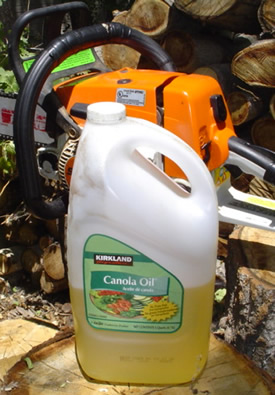|
|
Conventional wisdom says that one must use a bar/chain specific oil in their chainsaw. The underlying reason stems from an additive called tac that supposedly causes the oil to cling to the chain. This is good in theory but in reality, at 13,000+ RPM’s, little oil stays on the chain, tac or not. Chainsaws use what is known as a Total Loss Lubricating System. This means that regardless of oil type used, 100% of it is lost directly to the environment during use. The oil is simply flung off the bar tip and this is why many environmentally aware European countries inhibit the use of petroleum-based lubricants in chainsaws. And though not as widespread, there are also areas in North America restricting its use and agencies adapting to vegi-based oils including Denali and Point Reyes National Parks. Why are vegetable oils safer for the operator? A Total Loss Lubricating System + 13,000 RPM’s = oil misting. Inevitably, some of that oil gets inside the body by inhalation and or dermal absorption. In this regard, studies have shown vegetable oils to be safer than petroleum based oils.
Why not vegetable-based bar/chain specific oils? By all accounts, these would seem better than petroleum based lubricants. However, not only do these specialty oils cost 3-5 times that of straight vegetable oils, they contain unknown additives. Remember. These oils are only “vegetable-based”. Will straight off-the-shelf vegetable oil harm the chainsaw? Some of the original veggie oil advocates are professionals who have run their saws on a daily basis for years and report no adverse effects. From my perspective, the only negatives I have to report is when using in saws without adjustable oilers. Vegetable oils have lower viscosities than the bar/chain lubricants therefor flow more readily. In a saw with no adjustable oiler, this equates to refilling more often and a bigger mess with more oil being sprayed about. The other downside is the mess veggie oil can make if not regularly cleaned off the saw. While fine inside the saw, where the air can not get to and oxidize it, as soon as the oil leaves the saw, some of it inevitably gets in every nook and cranny eventually turning into a sticky and gooey mess that is extremely diffiucult to remove without the aid of powerful degreasers/solevents. For a professionals opinion on using vegetable oil, contact the Treeguy. Additional tips & considerations:
|
|
|

 Straight
vegetable oil from your local supermarket not only works well for
a bar/chain lubricant, it is less expensive than
petroleum based oils and safer for the operator
and ecosystem.
Straight
vegetable oil from your local supermarket not only works well for
a bar/chain lubricant, it is less expensive than
petroleum based oils and safer for the operator
and ecosystem.